In Photos: PM Narendra Modi Arrives In Sri Lanka For A 2-Day State Visit
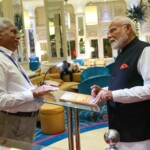
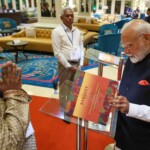
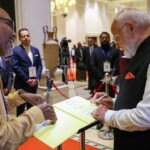
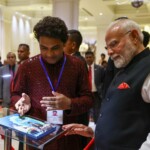
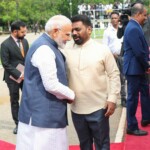
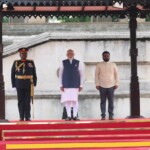
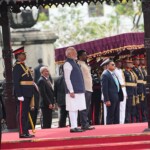
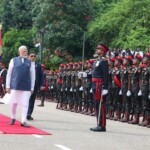
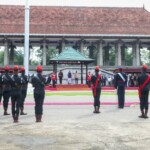
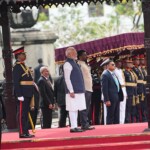
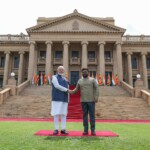
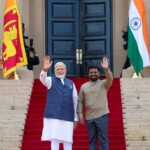
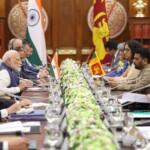
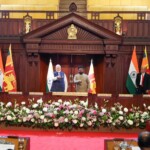
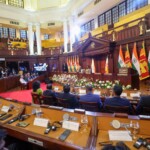
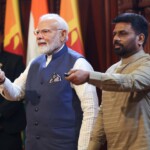
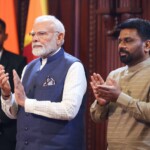
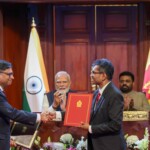


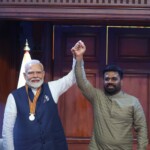
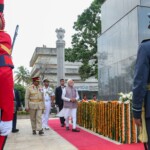
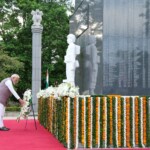


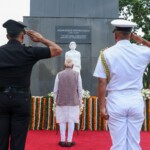
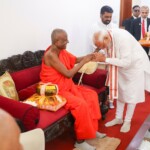
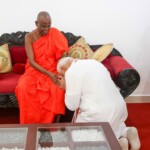
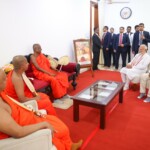

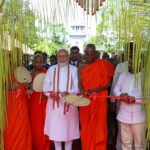



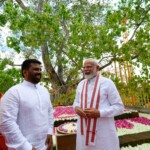

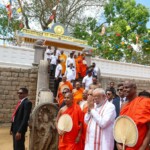
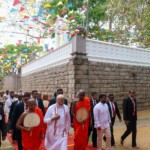
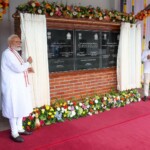











































Prime Minister Narendra Modi met Nepal’s Prime Minister KP Sharma Oli on the sidelines of the BIMSTEC Summit in Bangkok and said New Delhi attaches immense priority to relations with the Himalayan nation.
After the meeting, Modi said he had ‘productive’ talks with Nepal’s PM Oli.
“Had a productive meeting with Prime Minister KP Sharma Oli in Bangkok. India attaches immense priority to relations with Nepal,” Modi wrote on X after the meeting.
“We discussed different aspects of India-Nepal friendship, especially in sectors like energy, connectivity, culture and digital technology,” he said.
Modi discussed the positive outcomes of the BIMSTEC Summit, which ranged from maritime transport to disaster management, with Oli.
Narendra Modi, on Friday, proposed a 21-point Action Plan covering different aspects of cooperation among the BIMSTEC nations at the 6th BIMSTEC Summit in the Thai capital.
He remarked on boosting business across BIMSTEC nations and harnessing the rich potential of the IT sector.
He also urged the need to work together in the field of disaster management in the wake of the recent earthquake affecting Myanmar and Thailand.
Modi emphasised working in the world of space and strengthening the security apparatus.
Urging to collectively energise BIMSTEC and underlining the role of youth who will take the lead, he expressed hope that the cultural linkages will further bring the BIMSTEC nations closer.
Participating in the summit, 6th BIMSTEC (Bay of Bengal Initiative for Multi-Sectoral Technical and Economic Cooperation) Summit hosted by Thailand, the current chair, Modi underlined that the Group had become an impactful platform for regional cooperation, coordination and progress. In this regard, he called for further strengthening the agenda and capacity of BIMSTEC.
Prime Minister Modi announced several India-led initiatives towards institution and capacity building in BIMSTEC.
“These include the setting up of BIMSTEC Centres of Excellence in India on Disaster Management, Sustainable Maritime Transport, Traditional Medicine, and Research and Training in Agriculture.
He also announced a new programme for skilling the youth – BODHI [BIMSTEC for Organized Development of Human Resource Infrastructure] under which training and scholarships would be provided to professionals, students, researchers, diplomats and others,” read a statement issued by the Indian government.
He also offered a pilot study in India to assess regional needs in Digital Public Infrastructure and a capacity-building programme for cancer care in the region.
Calling for greater regional economic integration, Modi offered to establish the BIMSTEC Chamber of Commerce and to organise the BIMSTEC Business Summit every year in India.
(with inputs from IBNS)
Myanmar has announced that 180,000 Rohingya refugees who fled their homeland and are currently staying in Bangladesh are eligible to return, according to the Bangladesh government’s press office on Friday.
The announcement, following talks in Bangkok, offered a possible breakthrough in the long-stalled repatriation process, although many Rohingya refugees say all of them should be allowed to go home.
More than a million Rohingya have been crammed into the camps in southeastern Bangladesh, the world’s largest refugee settlement. Most fled a brutal crackdown by Myanmar’s military in 2017, although some have been there for longer.
Around 70,000 Rohingya crossed into Bangladesh last year, many fleeing worsening hunger and violence in Myanmar’s Rakhine State.
Friday’s announcement followed a meeting in Bangkok between Khalilur Rahman, High Representative of Bangladesh’s interim government led by Nobel laureate Muhammad Yunus, and Than Swe, Myanmar’s deputy prime minister and foreign minister, on the sidelines of the 6th BIMSTEC Summit.
The 180,000 names were part of a list of 800,000 Rohingya that Bangladesh submitted to Myanmar in six batches between 2018 and 2020. Myanmar has also indicated that final verification of another 70,000 refugees is pending further review of photographs and identity details.
The statement said Myanmar had pledged to expedite the verification process for the remaining 550,000 names on the original list.
Myanmar’s government did not immediately comment on the outcome of the meeting in Bangkok.
The Rohingya refugees have little hope of returning to their homeland, where they continue to face systematic denial of citizenship and basic rights.
Attempts to begin repatriation in 2018 and 2019 failed as the refugees, fearing prosecution, refused to go back.
“After all these years, they are confirming only 180,000 names. This feels like nothing more than an eyewash. We want a genuine solution,” one Rohingya refugee, Shafiqur Rahman, told Reuters.
“Myanmar must take all of us back — not just a selected few — and they must ensure we return with full rights, dignity, and citizenship. Without that, this process means nothing to us.”
(With inputs from Reuters)
The United Nations (UN) on Friday said 280,000 Gazans are estimated to have been newly displaced since the intensification of hostilities began in the region on March 18.
“Increasing numbers of people are moving into the remaining shelters, which are already overcrowded. Infestations of fleas and mites are reported, causing skin rashes and other health issues,” The UN Office for the Coordination of Humanitarian Affairs (OCHA) said in a statement.
OCHA says that addressing these challenges remains difficult due to the lack of necessary materials available in Gaza to implement vector control measures or improve hygiene conditions.
The recent killings of 15 medical personnel and humanitarian aid workers in Gaza raise further concerns over the commission of war crimes by the Israeli military, the UN High Commissioner for Human Rights told the Security Council on Thursday.
Ambassadors met for an emergency session to discuss the escalation in the Occupied Palestinian Territory.
Rights chief Volker Türk said he was pained to brief the Council once again on the “catastrophic suffering of people in Gaza,” noting that “the temporary relief of the ceasefire, which gave Palestinians a moment to breathe, has been shattered.”
The UN rights chief reported, citing local health authorities, that since March 1, Israeli military operations have killed more than 1,200 Gazans, including at least 320 children, according.
Türk said he was appalled by the killing of the medical and humanitarian personnel.
“There must be an independent, prompt and thorough investigation into the killings, and those responsible for any violation of international law must be held to account,” he said.
He highlighted that there is nowhere safe to go in Gaza amid ongoing bombardment. Furthermore, half of the territory is now under mandatory evacuation orders or has been declared a no-go zone.
At the same time, Hamas and other Palestinian armed groups continue to launch indiscriminate rockets from Gaza into Israel, in breach of international humanitarian law.
“I am also deeply concerned about the fate and well-being of Israeli hostages still held in Gaza,” he said.
Meanwhile, a month has passed since Israel imposed a complete blockade on vital humanitarian aid and supplies entering Gaza, including food, water, electricity, fuel and medicines.
“The blockade and siege imposed on Gaza amount to collective punishment and may also amount to the use of starvation as a method of war,” he said.
The UN rights chief was alarmed by the inflammatory rhetoric by senior Israeli officials around seizing, annexing and dividing territory, and about transferring Palestinians outside Gaza.
“This raises grave concerns about the commission of international crimes and runs counter to the fundamental principle of international law against the acquisition of territory by force,” he said.
(With inputs from IBNS)

The Trump administration approved the sale of over 20,000 U.S.-made assault rifles to Israel last month, according to a document seen by Reuters and a source familiar with the matter.
The deal, which had been stalled under former President Joe Biden due to concerns about their potential use by extremist Israeli settlers, is now moving forward.
The State Department sent a notification to Congress on March 6 of the $24 million sale of the Colt Carbine 5.56 mm caliber fully automatic rifles, saying the end user would be the Israeli National Police, according to the document.
The rifle sale is a small transaction next to the billions of dollars worth of weapons that Washington supplies to Israel. But it drew attention when the Biden administration delayed the sale over concerns that the weapons could end up in the hands of Israeli settlers, some of whom have attacked Palestinians in the Israeli-occupied West Bank.
The Biden administration had imposed sanctions on individuals and entities accused of committing violence in the West Bank, which has seen a rise in settler attacks on Palestinians.
On his first day in office on January 20, Trump issued an executive order rescinding the sanctions on the settlers in a reversal of U.S. policy. Since then, his administration has approved the sale of billions of dollars worth of weapons to Israel.
The March 6 congressional notification said the U.S. government had taken into account “political, military, economic, human rights, and arms control considerations.
The State Department did not provide comment when asked whether the administration sought assurances from Israel on the use of the weapons.
Since a 1967 Middle East war, Israel has occupied the West Bank, which Palestinians want as the core of an independent state, and has built settlements that most countries deem illegal. Israel disputes this, citing historical and biblical ties to the land.
Settler violence had been on the rise prior to the eruption of the Gaza war, and has worsened since the conflict began over a year ago.
Trump has forged close ties with Israeli Prime Minister Benjamin Netanyahu, pledging to back Israel in its war against Hamas in the Gaza Strip. His administration has in some cases pushed ahead with Israel arms sales despite requests from Democratic U.S. lawmakers that the sales be paused until they received more information.
The U.S. Senate on Thursday overwhelmingly rejected a bid to block $8.8 billion in arms sales to Israel over human rights concerns, voting 82-15 and 83-15 to reject two resolutions of disapproval over sales of massive bombs and other offensive military equipment.
The resolutions were offered by Senator Bernie Sanders of Vermont, an independent who caucuses with Democrats.
The rifle sale had been put on hold after Democratic lawmakers objected and sought information on how Israel planned to use them. The congressional committees eventually cleared the sale but the Biden administration kept the hold in place.
The latest episode in the decades-old Israeli-Palestinian conflict began with a Hamas attack on Israeli communities on October 7, 2023 with gunmen killing 1,200 people and taking more than 250 hostages, according to Israeli tallies. Israel’s campaign has so far killed more than 50,000 Palestinians, Gaza health authorities say.
Israel’s National Security Minister Itamar Ben-Gvir, a far-right member of Prime Minister Benjamin Netanyahu’s government, oversees the Israeli police force. The Times of Israel newspaper reported in November 2023 that his ministry put “a heavy emphasis on arming civilian security squads” in the aftermath of October 7 attacks.
(With inputs from Reuters)
Prime Minister Narendra Modi on Friday met Myanmar’s Junta Leader, Senior General Min Aung Hlaing, on the sidelines of the BIMSTEC Summit in Bangkok and condoled the loss of lives in the deadly earthquake that hit Myanmar last week.
During the meeting with the junta chief, Modi reassured India’s assistance to the people of Myanmar in this critical time.
“Both leaders discussed bilateral relations between India and Myanmar, particularly in sectors like connectivity, capacity building, infrastructure development and more,” read the statement issued by the Indian government.
After the meeting, Modi posted on X: “I had a separate meeting with Senior General Min Aung Hlaing of Myanmar on the sidelines of the BIMSTEC Summit in Bangkok, Thailand. I reiterated my condolences for the loss of lives and property due to the severe earthquake. India is doing everything possible to help our brothers and sisters in Myanmar in this difficult time.”
A 7.7 magnitude earthquake hit Myanmar last Friday, which left 3145 people dead.
India sent its medical, rescue experts and other humanitarian aid to the neighbouring nation after the quake.
Rescue operations in the country are still underway.
Apart from discussing the earthquake and its effect on the nation, Modi and the Myanmar leaders also held bilateral talks.
“We also discussed bilateral relations between India and Myanmar, particularly in sectors like connectivity, capacity building, infrastructure development and more,” Modi said.
Modi met the Prime Minister of Bhutan, Tshering Tobgay, on the sidelines of the 6th BIMSTEC summit in the Thai capital on Friday.
In a post on X, he stated: “Had a great conversation with my good friend, PM Tobgay. India’s friendship with Bhutan is robust. We are cooperating extensively in several sectors.”
Prime Minister Narendra Modi on Friday participated in the 6th BIMSTEC (Bay of Bengal Initiative for Multi-Sectoral Technical and Economic Cooperation) Summit hosted by Thailand, the current chair.
The theme of the Summit was – “BIMSTEC: Prosperous, Resilient and Open”.
It reflected the priorities of the leaders and the aspirations of the peoples of the BIMSTEC region, as well as the efforts of BIMSTEC in ensuring shared growth in times of global uncertainties.
The Prime Minister began his address by offering condolences on the loss of lives in the devastating earthquake in Myanmar and Thailand.
Highlighting BIMSTEC as a vital bridge between South Asia and South-East Asia, the Prime Minister underlined that the Group had become an impactful platform for regional cooperation, coordination and progress.
In this regard, he called for further strengthening the agenda and capacity of BIMSTEC.
The Prime Minister announced several India-led initiatives towards institution and capacity building in BIMSTEC.
These include the setting up of BIMSTEC Centres of Excellence in India on Disaster Management, Sustainable Maritime Transport, Traditional Medicine, and Research and Training in Agriculture.
He also announced a new programme for skilling the youth – BODHI [BIMSTEC for Organised Development of Human Resource Infrastructure] under which training and scholarships would be provided to professionals, students, researchers, diplomats and others.
He also offered a pilot study in India to assess regional needs in Digital Public Infrastructure and a capacity-building programme for cancer care in the region.
Calling for greater regional economic integration, the Modi offered to establish the BIMSTEC Chamber of Commerce and to organise the BIMSTEC Business Summit every year in India.
(With inputs from IBNS)
Turkey does not seek a confrontation with Israel in Syria, but continued Israeli airstrikes on military sites are weakening the new government’s ability to counter threats from groups like Islamic State, Turkey’s foreign minister told Reuters on Friday.
In an interview on the sidelines of a NATO foreign ministers’ meeting in Brussels, Hakan Fidan said Israel’s actions were fuelling regional instability by targeting Syria, where the government of President Ahmed al-Sharaa is a close ally of Turkey.
“We don’t want to see any confrontation with Israel in Syria because Syria belongs to Syrians,” Fidan said, adding that Syrians alone should decide their country’s security.
NATO member Turkey has fiercely criticised Israel over its attacks on Gaza since 2023, saying they amount to a genocide against the Palestinians, and has applied to join a case at the World Court against Israel while also halting all trade.
The animosity between the regional powers has spilled over into Syria, with Israeli forces striking Syria for weeks since a new administration took control in Damascus. Turkey has called the Israeli strikes an encroachment on Syrian territory, while Israel has said it would not allow any hostile forces in Syria.
In this “transition period”, Fidan said, Turkey does not want to see Islamic State (ISIS) or the Kurdistan Workers Party (PKK) militant group take advantage of “the absence of the regular forces, some absence of military capabilities” in Syria.
Unfortunately, Israel is taking out, one by one, all these capabilities that a new state can use against ISIS and other terrorist attacks and threats,” he said.
“What Israel is doing in Syria is not only threatening the security of Syria, but also is paving the way for future instability of the region”.
However, if the new administration in Damascus wants to have “certain understandings” with Israel, which like Turkey is a neighbour of Syria, then that is their own business, he added.
Turkey has emerged as one of the main foreign allies of Syria’s new Islamist government. Ankara had for years backed the rebels who now make up the bulk of the new government as they fought to topple former President Bashar al-Assad.
Turkey has vowed to help rebuild Syria, from infrastructure to state institutions, and provided it with political support in international platforms. It has called for the full lifting of Western sanctions on Syria for reconstruction efforts to start, while welcoming the formation of a transitional government.
On Friday, Fidan, who held talks last week with U.S. officials in Washington, said that he understood the administration of U.S. President Donald Trump was reviewing its policy regarding Syria and the sanctions imposed on it.
“They are… reviewing the Syrian file (and) understand that there is a need to make a change on sanctions policy because that was introduced for a different regime and different threat assessment,” Fidan said.
“Now we have a new Syria. I think that new Syria requires a different approach,” he said, adding that Ankara had been conveying its views on the matter to its Western allies.
While eyeing warmer ties with Washington under Trump and backing its initiative to end the Ukraine war, Turkey has also opposed some of the new administration’s Middle East policies, including a plan to take over the Gaza Strip and turn it into a “Riviera of the Middle East”.
Fidan pointed to Trump’s “problem-solving techniques” as a way of resolving lingering disputes between the two NATO allies, especially U.S. sanctions on Turkey’s defence industry, and added he was hopeful a solution could be found.
He said any possible peace deal brokered by the U.S. between Kyiv and Moscow would be “difficult to digest”, but still better than more death and destruction, and added a deterrence factor was needed to ensure the war did not restart.
Asked about Trump’s threats of U.S. military strikes against Iran, Fidan said diplomacy was needed to resolve the dispute and that Ankara did not want to see any attack taking place against its neighbour Iran.
(With inputs from Reuters)
As BIMSTEC leaders wound up discussions in Bangkok, Prime Minister Narendra Modi proposed linking India’s Unified Payments Interface (UPI) with the payment systems of BIMSTEC member nations, a move aimed at boosting trade, business, and tourism across the Bay of Bengal region.
“Connecting UPI with regional payment systems will facilitate seamless cross-border transactions, benefiting trade, industry, and tourism at all levels,” Modi said, highlighting the transformative power of digital platforms for the region’s future.
He recommended conducting a pilot study to assess the needs of BIMSTEC countries for Digital Public Infrastructure (DPI), drawing on India’s extensive experience in creating digital solutions.
In his address at the summit, Modi noted, “By sharing our experience, we can help other nations in the region build the digital infrastructure necessary to propel their economies into the future.”
This initiative would help bridge the digital divide and enhance access to services such as healthcare, education, and financial transactions across the region.
Modi also outlined plans to offer scholarships and training through the BODHI (BIMSTEC for Organized Development of Human Resource Infrastructure) program, aimed at skilling youth and professionals in digital technologies, governance, and other critical areas.
“BODHI will empower our youth and foster a culture of innovation that will drive regional prosperity,” he promised.
Modi proposed a BIMSTEC Centre of Excellence for Disaster Management in India, which would focus on enhancing regional cooperation in disaster preparedness, relief, and rehabilitation.
He said India would host the fourth joint BIMSTEC disaster management exercise later this year, reinforcing the region’s commitment to collective action in times of crisis.
Addressing the region’s growing security concerns, Modi called for the establishment of a Home Ministers’ Mechanism to combat cyber threats, terrorism, and other transnational crimes.
“This forum can play a vital role in addressing common security challenges and strengthening cooperation in law enforcement,” he said.
In the Space Sector, the prime minister talked about setting up ground stations for manpower training for BIMSTEC countries. And also, for use of remote sensing data, design, fabrication and launching of Nano Satellites.
The BIMSTEC Maritime Transport Agreement was signed to enhance cooperation in shipping, cargo transport, and safety protocols. Modi expressed confidence that this agreement would accelerate trade and improve logistical connectivity across the Bay of Bengal.
Furthermore, India proposed the establishment of a Sustainable Maritime Transport Centre in India to work on enhancing regional coordination in maritime research, policy development, and capacity building.
The prime minister has proposed the establishment of a BIMSTEC Chamber of Commerce to enhance trade and business links within the region, alongside annual BIMSTEC Business Summits. The creation of this forum is expected to help drive investments and create new opportunities for businesses in the Bay of Bengal area.
He also suggested exploring the feasibility of promoting trade in local currencies across BIMSTEC nations to reduce dependence on foreign currencies and enhance regional trade efficiency. This idea aligns with Modi’s vision of a more integrated regional economy, built on mutual trust and shared prosperity.
India will host the BIMSTEC Young Leaders’ Summit and BIMSTEC Hackathon later this year, creating platforms for young people to collaborate on regional challenges. Modi also proposed the establishment of the BIMSTEC Traditional Music Festival to celebrate the region’s rich cultural diversity.
India will also host the first BIMSTEC Athletics Meet this year and the inaugural BIMSTEC Games in 2027, marking the 30th anniversary of BIMSTEC.
U.S. President Donald Trump dubbed it “Liberation Day” as he unveiled reciprocal tariffs on Wednesday, but the move risks political backlash and economic fallout if his ambitious promises to revive U.S. manufacturing and reshape global supply chains fall short, according to experts.
In the meantime, consumers are likely to see higher prices, the economy could enter a downturn, and allies will put their own levies on American products – effects that Trump has called a “disturbance” but that voters may not be willing to accept going into the midterm elections next year.
Trump’s Republicans control the House of Representatives and the Senate with narrow margins. Tariff-driven losses in the midterms could hand power of one or both chambers to opposition Democrats.
“He (Trump) has a high tolerance for pain, but it could turn into real pain at the ballot box (in) November 2026,” said Mike Dubke, a former communications director for the president during his first term. “The concern here is what point are we going to see the benefits that he and his advisers believe we’re going to reap? Because he’s only got 18 months before the midterms.”
Economists say tariffs translate to taxes on consumers, and a broad majority of Americans – 70%, including 62% of Republicans – believe that increased tariffs will drive up the price of groceries and other consumer goods, according to a Reuters/Ipsos poll.
About 53% of respondents to the poll agreed with the statement that increased tariffs would do more harm than good, while 31% disagreed. The rest were unsure or did not answer about the potential risks of Trump tariffs.
Just 31% of respondents agreed that U.S. workers come out ahead when the country charges tariffs on imported goods, while 48% disagreed.
“The principal risk is around the economy,” said Lanhee Chen, a fellow at the Hoover Institution and former adviser to Republican leaders Mitt Romney and Marco Rubio, referring to the tariffs.
“One is an immediate risk on prices and what that means for a president who was elected in part to bring prices down,” he said. Another is the potential for the economy to enter a recessionary phase, said Chen, who cautioned that describing the potential economic impact was speculative and expressed support for the use of tariffs as a public policy tool.
Trump promised as a presidential candidate to bring prices down, and voters’ concerns about inflation hurt his 2024 opponent, former Vice President Kamala Harris, the Democratic presidential nominee.
On Wednesday, Trump said tariffs ranging from 34% on Chinese goods, in addition to a 20% levy that has already been imposed, to 20% tariffs on goods from the European Union, would enrich U.S. coffers.
“Now it’s our turn to prosper, and in so doing use trillions and trillions of dollars to reduce our taxes and pay down our national debt, and it will all happen very quickly,” he said.
Tariffs are paid by importers, not foreign countries, and they typically pass along the extra costs to consumers.
Hints of dissatisfaction with Trump are beginning to show among Republicans.
Republican candidates won two special elections in Florida on Tuesday by much slimmer margins than Trump won the state last year. In Wisconsin, an important political swing state that Trump carried, a liberal candidate won a seat on the state’s Supreme Court in a repudiation of Trump and his billionaire adviser Elon Musk, who had backed her conservative rival.
The U.S. Senate on Wednesday passed legislation that would terminate new tariffs on Canada in a 51-48 vote that drew support from four Republicans. On Thursday, one of the four and a senior Democrat introduced legislation to rein in Trump’s ability to impose tariffs. Both measures are likely to fail in the House.
Trump’s tariff announcement sent U.S. and global stocks tumbling. The president largely dismissed that on Thursday.
“The markets are going to boom, the stock is going to boom, the country is going to boom, and the rest of the world wants to see is there any way they can make a deal,” he told reporters at the White House.
A broad decrease in stock markets would hurt Americans’ retirement savings 401k accounts.
“Liberation Day appears to be about liberating American businesses and consumers from their money,” said one former Republican congressional aide, who spoke on the condition of anonymity. “You can’t stop an aircraft carrier on a dime and you can’t completely reshape the global economy in a day.”
The White House, which blames inflation on former President Joe Biden, says the Trump administration is doing everything it can to bring down the cost of living and dismisses concerns about the political ramifications of his trade agenda.
“President Trump’s first and only concern is the welfare of the American people. His historic trade action … reflects his commitment to restoring American Greatness for our industries and workers – not to indulging mindless political hypotheticals,” said White House spokesman Kush Desai.
Biden, a Democrat, also sought to increase domestic manufacturing and production with three landmark laws that directed trillions of dollars toward rebuilding U.S. infrastructure and promoting investment in strategic sectors such as semiconductors, energy production and electric vehicles.
Democrats are likely to pound Republicans over the economic impact of the tariffs.
The healthy economy Trump inherited from Biden – growth came in at nearly 3% in 2024, with unemployment around 4% and inflation under 3% – is showing signs of fraying, although the “hard” data economists use to measure things such as gross domestic product and employment has shown little evidence of a near-term slowdown.
Still, surveys measuring confidence in the economic outlook among households and businesses have turned uniformly downward in the last two months since Trump began his drumbeat on tariffs, a stark reversal of the optimism that greeted his election in November.
“From a political risk standpoint, this is a really bad idea,” said Philip Luck, director of the economics program at the Center for Strategic and International Studies and a former deputy chief economist at the State Department under Biden, noting the chance of retaliation from U.S. trading partners.
Barbara Trish, a political science professor at Grinnell College in Iowa, said Trump faced significant anxiety among voters, but in the past had always been able to escape deeper criticism.
“How many times have observers legitimately thought, OK, this is the last straw, the Teflon is going to take a hit, and it hasn’t happened?” she said.
Small business owners gave mixed reviews.
In Baltimore, a historically Democratic city, Drew Greenblatt, owner of Marlin Steel, said Trump’s tariffs were already helping boost orders as customers shift to American-made products.
But Michelle Lim Warner, the owner of DCanter wine boutique in Washington, D.C., was more pessimistic. European wines make up two-thirds of her selection, she said. “Who is going to pay $75 for what was a $25 bottle of wine?”
(With inputs from Reuters)
Oil prices dropped by 8% on Friday, nearing their lowest level since the peak of the coronavirus pandemic in 2021. The decline comes as China retaliated in the intensifying global trade conflict with the U.S., following President Donald Trump’s series of tariffs announced earlier this week.
China announced it will impose additional tariffs of 34% on all U.S. goods from April 10. Nations around the world have readied retaliation after Trump raised tariff barriers to their highest in more than a century, leading to a plunge in world financial markets.
Brent futures dived by $5.30, or 7.6%, to $64.84 a barrel by 1254 GMT. U.S. West Texas Intermediate crude futures lost $5.47, or 8.2%, to $61.48.
Both benchmarks were on course for their biggest weekly losses in percentage terms in more than two years.
“China’s aggressive countermove to U.S. tariffs all but confirms we are heading towards a global trade war; a war that has no winners and which will hurt economic growth and demand for key commodities such as crude oil and refined products,” said Ole Hansen, head of commodity strategy at Saxo Bank.
Fuelling the oil sell-off was a decision by the Organization of the Petroleum Exporting Countries and its allies, known collectively as OPEC+, to advance plans for output increases, with the group now aiming to return 411,000 barrels per day (bpd) to the market in May, up from the previously planned 135,000 bpd.
Imports of oil, gas and refined products were given exemptions from Trump’s sweeping new tariffs, but the policies could stoke inflation, slow economic growth and intensify trade disputes, weighing on oil prices.
Goldman Sachs analysts responded with sharp cuts to their December 2025 targets for Brent and WTI by $5 each to $66 and $62 respectively.
“The risks to our reduced oil price forecast are to the downside, especially for 2026, given growing risks of recession and to a lesser extent of higher OPEC+ supply,” the bank’s head of oil research, Daan Struyven, said in a note.
(With inputs from Reuters)
At the recently concluded BIMSTEC summit in Bangkok, regional cooperation appeared to gain traction, even as old hurdles remained.
In this edition of The Gist, Dr. Constantino Xavier, senior fellow in foreign policy and security studies at the Centre for Social and Economic Progress, reflects on both the promise and pitfalls of the multilateral gathering.
“Like many regional summits, BIMSTEC is as much about bilateral exchanges in the margins as it is about formal multilateral outcomes,” he said. Despite this, Dr Xavier noted a growing political momentum, with leaders meeting more regularly to shape a collective vision for the Bay of Bengal region.
One of the key takeaways from the summit was Prime Minister Modi’s announcement of a BIMSTEC Home Ministers’ mechanism, focused on cross-border security issues such as trafficking and insurgency. “This reflects a growing comfort among member states to discuss sensitive security challenges together,” he said.
However, the economic front showed little progress. Talks on a free trade agreement—stalled since 2004—remained stagnant. “It’s a clear signal that the broader regional trade agenda is struggling,” Xavier observed.
Interestingly, power dynamics within the bloc appear to be shifting. While smaller nations have historically viewed India’s influence with caution, Xavier suggests a reversal. “Except for Bangladesh, most member states now see India as an anchor for economic and strategic stability—and want more, not less, Indian leadership,” he said.
Still, irritants persist. Non-tariff barriers and red tape hamper regional trade. “We’re still stuck in outdated bureaucratic systems where, absurdly, each sock is counted as a separate item,” he pointed out. Despite these quirks, India has made strides in trade facilitation and connectivity.
As for tangible outcomes, Xavier highlighted three: greater energy cooperation, deeper regional security dialogue, and a growing push for infrastructure connectivity. While critics question BIMSTEC’s pace, Xavier stressed that summits are just the visible tip of ongoing work. “The real action happens between the summits—in the quiet but crucial sectoral meetings.”
In a region grappling with economic transitions and strategic flux, BIMSTEC may not be moving fast—but it is moving. Watch the full interview here to get some fascinating insights into why BIMSTEC matters.
Anxiety is sweeping through Surat, India’s diamond polishing hub, as the threat of hefty U.S. tariffs looms over the nation’s gem and jewelry exports, jeopardizing the livelihoods of thousands of workers.
The United States, which takes more than 30% of the South Asian nation’s gem and jewellery exports, set a 27% reciprocal tariff on it on Thursday, at a time when demand is softening in other key markets such as China, the Middle East, and Europe.
“Tariffs will hit hard the demand for diamonds in the United States and job losses look inevitable, at least in the short term,” said Dinesh Navadiya, chairman of the Surat-based Indian Diamond Institute.
Surat, the second-largest city in Gujarat, the western home state of Prime Minister Narendra Modi, processes and polishes more than 80% of the world’s rough diamonds, and India accounts for nine in every 10 diamonds processed globally.
Business has ground to a halt in its teeming diamond market, where more than 10,000 traders and brokers gather each day, as the industry tries to figure out how matters will evolve in the coming months.
Conditions are worse than during the 2008 financial crisis, when the industry was plagued by fears of a prolonged recession, said Mansukh Mangukiya, a diamond trader for five decades.
A slowdown in the industry will hit all manufacturers, but smaller players will suffer most, said Sevanti Shah, chairman of Venus Jewels, adding, “Many smaller manufacturers will have no choice but to shut down.”
The United States accounted for nearly $10 billion, or 30.4%, of India’s annual gems and jewellery exports, totalling $32 billion in the fiscal year 2023/24.
Gems and jewellery are India’s third largest export to the United States, after engineering and electronic goods, and employ millions of workers, including artisans.
Poorer business prospects also raise questions about the future of the Surat Diamond Bourse, inaugurated by Modi in 2023 to create thousands of new jobs and serve as a trade hub.
Built over 6.6 million square feet, it was touted as the world’s largest office building, surpassing the Pentagon.
The industry will seek alternative markets to compensate for the loss of U.S. demand, but no other country will be able to replace the U.S. market, diamond dealers said.
The sudden decline in U.S. demand would require short-term production adjustments within the industry and could lead to reduced rough diamond imports, said Shaunak Parikh, vice chairman of the Gem and Jewellery Export Promotion Council.
Exporters are making last-minute efforts to ship as much as possible to the United States before its new tariffs take effect, Parikh said, while orders that cannot be delivered earlier may be cancelled or put on hold.
The tariffs would also drive up U.S. prices, crimping demand, said Vipul Shah, managing director of Asian Star, a leading diamond exporter.
An uncertain future lies ahead for Chetan Navadiya, a diamond manufacturer turned job-work contractor.
“I lost my business due to the market slowdown,” Navadiya said. “I took up job work to survive, but even those contracts may not come by now, because of U.S. tariffs.”
(With inputs from Reuters)
On Friday, China imposed a 34% tariff on U.S. goods, marking the most significant escalation in the trade conflict with President Donald Trump. The move has fueled concerns about a potential recession and triggered a global downturn in stock markets.
Beijing also announced it was adding several U.S. entities to an export control list and classifying others as an “unreliable” entity.
On Thursday, China had called on the U.S. to cancel its latest tariffs immediately and promised to take countermeasures to protect its interests, following Trump’s announcement of broad levies on all U.S. trading partners.
The U.S. move disregards the balance of interests reached in multilateral trade negotiations over the years and the fact that it has long benefited greatly from international trade, the Chinese commerce ministry said in a statement.
“China firmly opposes this and will take countermeasures to safeguard its own rights and interests,” the ministry said, as the world’s largest economies look set to spiral deeper into a trade war that stands to upend global supply chains.
Trump on Wednesday announced China would be hit with a 34% tariff, on top of the 20% he previously imposed earlier this year, bringing the total new levies to 54% and close to the 60% figure he had threatened while on the campaign trail.
Chinese exporters, as with those from every other economy, will face a 10% baseline tariff, as part of the new 34% levy, on almost all goods shipped to the world’s largest consumer economy from Saturday before the remaining, higher “reciprocal tariffs” take effect from April 9.
Trump also signed an executive order closing a trade loophole known as “de minimis” that has allowed low-value packages from China and Hong Kong to enter the U.S. duty free.
Nations from Canada to China have readied retaliation in an escalating trade war after Trump raised U.S. tariff barriers to their highest level in more than a century this week, leading to a plunge in world financial markets.
In Japan, one of United States’ top trading partners, Prime Minister Shigeru Ishiba said that the tariffs had created a “national crisis” as a plunge in banking shares on Friday set Tokyo’s stock market on course for its worst week in years.
Investment bank JP Morgan said it now sees a 60% chance of the global economy entering recession by year end, up from 40% previously.
(With inputs from Reuters)
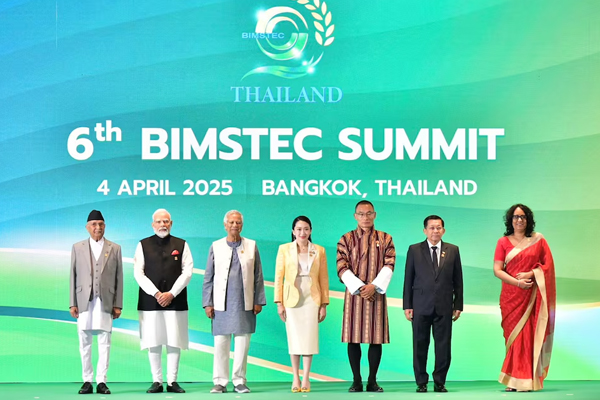
Myanmar‘s military junta chief attended the BIMSTEC summit in Bangkok on Friday, one week after a powerful earthquake ravaged parts of the impoverished, war-torn nation, killing over 3,100 and prompting a humanitarian appeal from the United Nations chief.
Shunned by most world leaders since leading a 2021 coup that overthrew an elected government, Myanmar’s junta leader Min Aung Hlaing’s rare trip exploits a window opened by the earthquake to ramp up diplomacy at regional events such as the BIMSTEC summit in the Thai capital.
On the sidelines, Min Aung Hlaing had two-way meetings with Thai premier Paetongtarn Shinawatra and Indian Prime Minister Narendra Modi.
Amid the quake recovery effort, the junta chief will talk about “the potential for cooperation … to carry out rescue, relief and rehabilitation,” the state-run Global New Light of Myanmar newspaper said.
The death toll from Friday’s earthquake of magnitude 7.7, one of the strongest to hit the Southeast Asian nation in a century, climbed to 3,145, with more than 4,500 injured and more than 200 missing, the ruling junta said.
“The earthquake has supercharged the suffering, with the monsoon season just around the corner,” U.N. Secretary-General Antonio Guterres told reporters on Thursday, referring to civil strife unleashed by the coup.
“I appeal for every effort to transform this tragic moment into an opportunity for the people of Myanmar.”
United Nations aid chief Tom Fletcher is set to arrive in Myanmar on Friday, followed by a visit by Julie Bishop, the United Nations’ special envoy for the country.
Min Aung Hlaing, who led an entourage of Myanmar officials, also met Nepal’s prime minister on Thursday, state media said, ahead of the summit focused on technical and economic matters.
He sat between the prime ministers of Bhutan and Sri Lanka at the head table during Thursday’s dinner with heads of BIMSTEC nations, Thai government photographs show.
In a post on X after meeting Min Aung Hlaing, India’s Modi said cooperation on connectivity, capacity building and infrastructure development featured in their discussions.
With the Thai prime minister, the junta leader discussed disaster prevention, transnational crime and repatriation of those pulled out of scam centres, Thai officials said.
The summit is part of BIMSTEC or the Bay of Bengal Initiative for Multi-Sectoral Technical and Economic Cooperation, which groups Thailand, Myanmar, India, Bangladesh, Nepal, Sri Lanka and Bhutan.
Even before the quake, millions had suffered in Myanmar’s widening civil war, triggered by the coup that ousted the government of Nobel peace laureate Aung San Suu Kyi.
It has decimated the mainly agrarian economy, driven more than 3.5 million people from their homes and crippled essential services such as healthcare.
Myanmar’s neighbours, such as China, India and Southeast Asian nations are among the countries that dispatched relief supplies and rescuers to aid the recovery effort in quake-hit areas home to about 28 million people.
Extreme heat and forecast heavy rain could cause disease outbreaks among earthquake survivors camping in the open, as the risk of cholera grows in such areas, namely Mandalay, Sagaing and the capital of Naypyitaw.
“Response efforts still face significant logistical challenges … hampering the relief response,” the World Food Programme said on Thursday. Hurdles range from debris and damaged roads and facilities to telecoms disruption, it said.
This week, the junta called a temporary ceasefire from Wednesday to April 22 in operations against armed opponents, reflecting moves by a major rebel alliance and Myanmar’s shadow government that groups parts of the previous administration.
(With inputs from Reuters)
Indian Prime Minister Narendra Modi on Friday met Bangladesh interim government chief Muhammad Yunus on the sidelines of the ongoing BIMSTEC Summit in Bangkok, days after the Nobel Laureate’s comment on Northeast India triggered a row.
This is the first time Modi and Yunus have met since he took charge of Bangladesh’s interim government following former Prime Minister Sheikh Hasina’s ouster amid severe student-led mass protests.
The relationship between India and Bangladesh turned frosty following the toppling of Hasina’s regime, who is seen as a pro-Delhi leader.
Hasina fled to India following the sudden end of her regime on August 5, 2024, months after she came back to power by winning the general polls.
India expressed concerns over the rise in atrocities against minorities in the South Asian country following Hasina’s exit.
The meeting occurred amid Dhaka’s growing closeness with China.
Indian Minister of External Affairs S Jaishankar on Thursday targeted Bangladesh Interim Government chief Muhammad Yunus over his comment on ‘North-East’ and said cooperation is not subject to “cherry-picking”.
Speaking at the 6th BIMSTEC Summit in Thailand, Jaishankar sent out a strong message to Yunus and his administration and said India has the longest coastline in the Bay of Bengal.
Jaishankar said, “India is aware of its special responsibility in regard to BIMSTEC. We, after all, have the longest coastline in the Bay of Bengal, of almost 6500km.”
Countering Yunus’s remarks, he said India’s Northeast region has now emerged as a connectivity hub for the BIMSTEC.
“India shares borders not only with five BIMSTEC members, connects most of them, but also provides much of the interface between the Indian Sub-continent and ASEAN. Our North-Eastern region in particular is emerging as a connectivity hub for the BIMSTEC, with a myriad network of roads, railways, waterways, grids and pipelines. Furthermore, the completion of the Trilateral Highway will connect India’s North East all the way to the Pacific Ocean, a veritable game-changer,” he said.
“We are conscious that our cooperation and facilitation are an essential pre-requisite for the smooth flow of goods, services and people in this larger geography,” Jaishankar said.
“Keeping this geo-strategic factor in mind, we have devoted increasing energies and attention to the strengthening of BIMSTEC in the last decade. We also believe that cooperation is an integrated outlook, not one subject to cherry-picking,” he said.
In a video which went viral on social media, Yunus was probably during his four-day trip to China had made a controversial comment, referring to India’s Northeast as an opportunity for Beijing’s economic expansion.
Yunus was heard saying, “The seven states of India, the eastern part of India, are called the seven sisters. They are a landlocked region of India. They have no way to reach out to the ocean… This opens up a huge possibility. This could be an extension for the Chinese economy.”
The bilateral tension between India and Bangladesh brewed after the fall of the pro-Delhi Sheikh Hasina government in August last year, followed by attacks on minorities in the South Asian country.
After Hasina fled to India, facing violent protests that started with anti-quota agitation, Yunus was appointed as the advisor to the interim government in Bangladesh.
(With inputs from IBNS)
South Korea’s Constitutional Court removed President Yoon Suk Yeol from office on Friday over his shocking declaration of martial law, triggering the country’s worst political crisis in decades and unsettling financial markets.
South Korea, which has been witnessing a political crisis since Yoon’s impeachment, will have to hold a fresh presidential election within 60 days. Until then, Prime Minister Han Duck-soo will remain as acting president.
The new president will take office as soon as the National Election Commission declares the results.
After South Korea’s last impeachment and removal, in 2017, a presidential election was held on May 9 following the Constitutional Court’s decision to remove then-President Park Geun-hye on March 9.
Park’s successor was inaugurated the day after that vote.
Polls show opposition leader Lee Jae-myung, who narrowly lost to Yoon in the 2022 presidential election, is maintaining his lead for the snap election, leaving no major challengers.
A populist outsider and former governor of the most populous province in South Korea, Lee has, however, been beset by his own legal troubles and scandals that could bar him from an election run. He faces trials in cases from bribery to charges related to a property development scandal.
Whoever wins the election, the priority will be to bring stability to domestic politics and take on the daunting task of dealing with U.S. President Donald Trump.
Trump has been pressuring allies with tariffs and demanding that South Korea pay more for American troops stationed there.
Tension on the Korean peninsula is also running high. Yoon took a hard line against North Korea, amid Pyongyang’s advances in military and space capabilities and warming ties with Russia.
South Korea suspended a military pact with the North meant to reduce military tension by curbing live-fire exercises along the border. The North’s constitution has designated South Korea as the principal enemy.
In separate criminal proceedings, Yoon was indicted in January on charges of insurrection, punishable by life imprisonment or even death, although South Korea has not executed anyone in decades.
A defiant Yoon has denied he masterminded an insurrection.
Yoon, a former prosecutor, used to put people in jail. But, he became the first incumbent South Korean leader to be arrested in January, after initially defying efforts to question him in the criminal case.
He has now been freed from detention after a court quashed his arrest warrant while he stands trial.
Yoon’s removal from office was the culmination of months of turmoil in which hundreds of thousands of South Koreans took to the streets, week after week, either to protest or support him.
The upheaval has further exposed deep social rifts between conservatives and liberals and stepped up pressure on institutions and the military, which had found itself in a quandary over whether to enforce martial law.
Political dysfunction marked the run-up to Yoon’s martial law declaration, with the opposition-led parliament blocking much of his agenda and impeaching a string of officials.
It remains unclear whether Yoon’s fired-up supporters will now accept the court’s ruling or continue their street protests.
(With inputs from Reuters)
IMF managing director Kristalina Georgieva on Thursday said the latest U.S. tariffs imposed by President Donald Trump pose a significant risk to the global outlook.
She said it was essential to take any step that would harm the world economy.
In a statement, she said that the IMF is “still assessing the macroeconomic implications” of Trump’s tariff measures, but they “clearly represent a significant risk to the global outlook at a time of sluggish growth.”
She said: “It is important to avoid steps that could further harm the world economy.”
She appealed to the United States and its trading partners to work constructively to resolve trade tensions and reduce uncertainty.
“We will share the results of our assessment in the World Economic Outlook, which will be published at the time of the IMF/World Bank Spring Meetings later this month, the IMF Chief said.
Triggering almost a global trade war, US President Donald Trump on Wednesday announced tariffs of at least 10 percent on almost all goods from other countries, plus even higher rates for many nations, including friends, but deemed to be “worst offenders”.
Addressing an audience in the Rose Gardens of the White House, including rows of construction helmet-wearing workers, Donald Trump said: “The tariffs will not be fully reciprocal. I could have done that, I guess. But it would have been tough for a lot of countries.”
His nearly 50-minute-long speech from the White House Rose Garden was attended by his cabinet and representatives of the US steel and auto industries besides people from the working class. He called April 2 a “Liberation Day” for America.
Among the countries being targeted with reciprocal tariffs are China, Vietnam, Taiwan, Japan, India, South Korea, Thailand, Switzerland, Indonesia, Malaysia, Cambodia and the European Union.
Trump announced a 34 percent reciprocal tariff on China, 26 percent on India and 20 percent on the European Union.
“The United States imposes a 2.5% tariff on passenger vehicle imports (with internal combustion engines), while the European Union (10%) and India (70%) impose much higher duties on the same product.
“For networking switches and routers, the United States imposes a 0% tariff, but India (10-20%) levies higher rates. Brazil (18%) and Indonesia (30%) impose a higher tariff on ethanol than does the United States (2.5%). For rice in the husk, the U.S. imposes a tariff of 2.7%, while India (80%), Malaysia (40%), and Turkey (31%) impose higher rates,” his factsheet posted on the White House site said.
Apples enter the United States duty-free, but not so in Turkey (60.3%) and India (50%), it said.
(With inputs from IBNS)
U.S. President Donald Trump expressed his support for French far-right leader Marine Le Pen on Thursday after a Paris court found her and several members of her National Rally (RN) party guilty of misusing European Union funds earlier this week.
A judge handed Le Pen an immediate five-year ban on running for office that will bar her from the 2027 presidential election unless she can get the ruling overturned on appeal beforehand.
The judge is now under police protection after facing death threats, a source told Reuters on Wednesday.
Le Pen, RN allies and her supporters accused the trial judges of interfering in democracy. French Prime Minister Francois Bayrou told lawmakers on Tuesday that he “unconditionally supported” the judiciary.
In a Truth Social post late on Thursday, Trump called the case against Le Pen a “Witch Hunt” while praising the far-right leader.
“She suffered losses, but kept on going, and now, just before what would be a Big Victory, they get her on a minor charge that she probably knew nothing about – Sounds like a ‘bookkeeping’ error to me,” Trump said in his post.
Rights advocates have drawn comparisons over the years between Le Pen and Trump over their anti-immigration views and charged rhetoric against minorities.
The French court’s ruling was a setback for Le Pen, 56. She was a front-runner in polls for France’s 2027 contest until her conviction. Trump compared Le Pen’s situation to his own.
Trump was indicted over covering up a hush money payment to a porn star, over attempts to overturn the results of the 2020 election that he lost and over retention of classified documents after his first term ended. He was convicted in the hush money case. He denied wrongdoing in all cases that he called politically motivated.
Federal charges against him were dropped following his 2024 election win.
“It is all so bad for France,” Trump said in his post.
(With inputs from Reuters)
The U.S. Senate on Thursday strongly opposed an attempt to stop $8.8 billion in arms sales to Israel. The move came amid concerns over the humanitarian crisis in Gaza following Israel’s airstrikes and restrictions on aid deliveries.
The Senate voted 82-15 and 83-15 to reject two resolutions of disapproval over sales of massive bombs and other offensive military equipment. The resolutions were offered by Senator Bernie Sanders of Vermont, an independent who caucuses with Democrats.
In each case, Democratic Senator Tammy Baldwin of Wisconsin voted “present.”
A decades-long tradition of strong bipartisan support for Israel in the U.S. Congress means resolutions to stop weapons sales are unlikely to pass, but backers hope raising the issue will encourage Israel’s government and U.S. administrations to do more to protect civilians.
In remarks urging support for the resolutions, Sanders described the toll on civilians – with thousands of children facing malnutrition and starvation, especially from a recent blockade of humanitarian assistance.
“What is happening right now is unthinkable. Today it is 31 days and counting with absolutely no humanitarian aid getting into Gaza, nothing. No food, no water, no medicine, no fuel, for over a month,” Sanders said.
The suspension, which Israel says is aimed at pressuring militant group Hamas in ceasefire talks, applies to food, medicine and fuel imports.
Senate Foreign Relations Committee Chairman James Risch urged defeat of the Sanders resolutions, saying, “They would abandon Israel, our closest ally in the Middle East, during a pivotal moment for global security.”
More than 50,000 Palestinians have been killed by the Israeli campaign in Gaza, Palestinian officials say. It was launched after thousands of Hamas-led gunmen attacked southern Israel on October 7, 2023, killing 1,200 people and abducting 251 as hostages, according to Israeli tallies.
Much of Gaza has been reduced to rubble, leaving hundreds of thousands of people sheltering in tents or bombed-out buildings.
Thursday’s vote took place the same day that hundreds of thousands of Gazans fled in search of shelter in one of the biggest mass displacements of the war. Israeli forces are advancing into the ruins of the city of Rafah, part of a newly announced “security zone” they intend to seize.
The Senate voted overwhelmingly in November to block three resolutions introduced by Sanders that would have halted transfers of weapons approved by the administration of then-President Joe Biden, a Democrat whom some progressives criticized as doing too little to help Palestinians as conditions in Gaza worsened.
President Donald Trump, who began a second term on January 20 and is a fierce advocate for Israel, has reversed Biden’s efforts to place some limits on what arms are sent to Netanyahu’s government. He has also floated the idea of transferring Palestinians out of Gaza and turning the enclave into “the Riviera of the Middle East.”
Trump earlier this year sidestepped the congressional review process to approve billions of dollars in military sales to Israel.
U.S. law gives Congress the right to review major foreign weapons sales and block them by passing resolutions of disapproval. Although no such resolution has both passed Congress and survived a presidential veto, the law requires the Senate to vote if a resolution is filed. Such resolutions have at times led to angry debates embarrassing to past presidents.
(With inputs from Reuters)
Yvon Castel, a long-time supporter of the far-right National Rally, says he is unimpressed by Marine Le Pen’s tactics to overturn a legal ruling that blocked her from the 2027 elections. “She’s not above the law,” the 72-year-old remarked, a sentiment shared by others in Toulon, a sun-drenched port city with a strong far-right following.
A Paris court convicted Le Pen and two dozen National Rally (RN) party members of embezzling EU funds on Monday. It imposed an immediate five-year ban on Le Pen running for office that will prevent her from standing in 2027 unless she can get the ruling overturned next summer.
Le Pen has called for a peaceful mass protest in Paris on Sunday, which will give an indication of how much popular support there is for her claims of a democratic crisis.
But her and her allies’ attacks against the “tyranny of judges” have played badly, particularly after the lead judge who convicted her had to get police protection following death threats. President Emmanuel Macron called those threats “unbearable and intolerable.”
Castel was also not pleased. “I don’t like the fact she’s attacking judges,” he said, underlining the challenges Le Pen faces winning over supporters who, for all their backing for her disruptive party, are not against the courts.
Polls show a majority of French people don’t see any problem with the court’s decision. Some 65% of respondents said they were “not shocked” by the verdict and 54% said Le Pen was treated like any other defendant, according to an Odoxa poll.
“The RN’s point doesn’t fly with the wider public opinion,” Odoxa’s Gael Sliman told Reuters. “They can’t go too far in attacking judges, especially if they want to broaden their appeal. Some of their voters are not anti-establishment.”
That was especially the case among older voters, a segment of the population the RN is courting to win power in 2027.
“You can’t steal 4 million euros like that from people. The verdict was fair,” Francoise Bellis, a 77-year old pensioner, said. She laughed when she heard Russia saying the verdict had “killed democracy” in France.
“That’s really the pot calling the kettle black,” she added.
Toulon, one of France’s historic naval bases, plays a central role in the RN’s history. The city was governed by what was then known as the National Front in the late 1990s, one of the first major mayorships the once-fringe party won.
The experience left a bitter taste for some voters after former far-right mayor, Jean-Marie Le Chevallier, was found guilty of corruption and left the city’s coffers empty.
After years of trying to professionalize the party and clean up its image, Le Pen had been hoping to reconquer Toulon. Laure Lavalette, a Le Pen lieutenant who represents a Toulon voting district in the National Assembly, has yet to announce her candidacy, but is widely expected to run for mayor in 2026.
Lavalette did not return a request for comment. Her rivals said Le Pen’s conviction would dredge up bad memories of RN wrongdoing for many in Toulon.
“The people in Toulon are going to think twice before giving their vote to the RN now,” said Eddie Goujit, a young entrepreneur who has launched a long-shot bid for mayor. “I think Laure Lavalette had strong chances, but the court’s decision is going to hurt a lot.”
Another factor undermining the RN’s anti-judicial strategy in Toulon is the fact that former Mayor Hubert Falco – a Macron supporter who was convicted of graft in 2023 – received the same public office ban as Le Pen. Falco’s lawyers did not return a request for comment.
Le Pen’s ban has opened her up to competition from within her ranks. Her 29-year old protege, party president Jordan Bardella, is wildly popular among the RN’s younger, working class voters and must now walk a tightrope between his political ambitions and loyalty to his boss.
Constance Pellegrini, a 30-year-old security agent and longtime RN supporter, said Le Pen was clearly “being squashed to prevent her from becoming president”.
But she said a generational handover was no bad thing: “The political world is scared of her. But fingers crossed the young Bardella will replace her.”
(With inputs from Reuters)